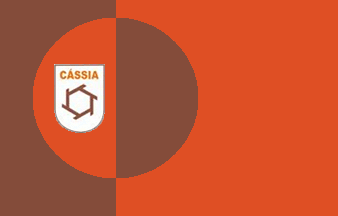 image
by Dirk Schönberger, 17 June 2010
image
by Dirk Schönberger, 17 June 2010Source: http://www.cassia.mg.gov.br/bandeira.php

Last modified: 2016-11-30 by ian macdonald
Keywords: minas gerais | cássia |
Links: FOTW homepage |
search |
disclaimer and copyright |
write us |
mirrors
 image
by Dirk Schönberger, 17 June 2010
image
by Dirk Schönberger, 17 June 2010
Source:
http://www.cassia.mg.gov.br/bandeira.php
Vertically divided 1:2 purplish brown and red, with a large disk counterchanged, and on the red (hoist) half the badge of the municipality.
Official website at
http://www.cassia.mg.gov.br/.
Dirk Schönberger,
17 June 2010
The municipality of Cássia (17,428 inhabitants in 2010; 644 sq. km) is
located in south-southwestern Minas Gerais, 400 km of Belo Horizonte.
Cássia was settled around 1750 in an area disputed for its gold resources
between the Minas Gerais and São Paulo States - the dispute was solved only
in 1936. The place was well-known to muleteers, mules being then the main
means of transport in Brazil, used to ship gold to the sea ports and all
kinds of goods to the towns of the hinterland. In the beginning of the 19th
century, the exhaustion of gold mines caused emigration and development of
agricultural and cattle-breeding around São Paulo. Cássia, located in the Rio
Grande valley, became a small nucleus of colonization. The town was soon the
place of one of the most important cattle market in southern Minas Gerais.
In 1855, the small village of Santa Rita de Cássia was made a district of the
municipality of Passos; in 1890, the "vila" of Cássia became a municipality,
seceding from Passos.
The symbols of Cássia were created by a design
agency from Belo Horizonte, commissioned by Municipal Law No. 427 of 30
November 1970.
http://www.cassia.mg.gov.br/bandeira.php - Municipal
website
Ivan Sache, 29 January 2012